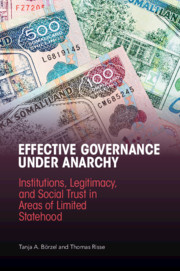 Effective Governance Under Anarchy
Effective Governance Under Anarchy Book contents
- Effective Governance Under Anarchy
- Effective Governance Under Anarchy
- Copyright page
- Contents
- Figures
- Tables
- Preface
- Abbreviations
- 1 Introduction
- Part I Setting the Stage: Concepts and Theories
- Part II Governance in Areas of Limited Statehood: Empirical Evidence
- 4 Who, Why, and How? Actors and Modes of Governance
- 5 Security
- 6 Human Rights, Rule of Law, and Democracy
- 7 Welfare
- 8 Conclusions
- References
- Index
5 - Security
from Part II - Governance in Areas of Limited Statehood: Empirical Evidence
Published online by Cambridge University Press: 09 April 2021
- Effective Governance Under Anarchy
- Effective Governance Under Anarchy
- Copyright page
- Contents
- Figures
- Tables
- Preface
- Abbreviations
- 1 Introduction
- Part I Setting the Stage: Concepts and Theories
- Part II Governance in Areas of Limited Statehood: Empirical Evidence
- 4 Who, Why, and How? Actors and Modes of Governance
- 5 Security
- 6 Human Rights, Rule of Law, and Democracy
- 7 Welfare
- 8 Conclusions
- References
- Index
Summary
Chapter 5 deals with the provision of security in areas of limited statehood. We contest the notion that areas of limited statehood are mostly violent places where civil war prevails. We analyze peacekeeping missions, military interventions from the outside, as well as externally promoted security sector reform. We find that more limited external governance fostering inclusive post-conflict peace-building and security sector reform is more effective than comprehensive state-building efforts. We then look at the conditions under which violent non-state actors can provide public security in the territory that they control. Warlord governance tends to be rather ineffective. Rebel groups score better, particularly when they face high legitimacy needs and local communities with strong trust-based action capacity to hold them accountable. The chapter also looks at tribal groups and leaders as rather effective peace-keepers. They normally lack military enforcement capacity, but can rely on strong social norms to maintain security in communities. While “security under anarchy” is possible in areas of limited statehood, our findings cast serious doubts on whether public security governance can be sustainable in the long run, if a (state) monopoly of the use of force is not restored at some point.
Keywords
- Type
- Chapter
- Information
- Effective Governance Under AnarchyInstitutions, Legitimacy, and Social Trust in Areas of Limited Statehood, pp. 145 - 180Publisher: Cambridge University PressPrint publication year: 2021
